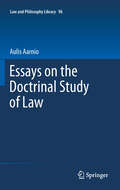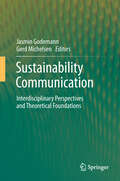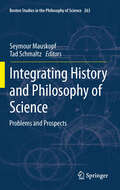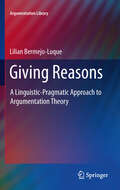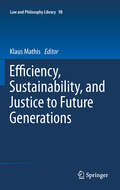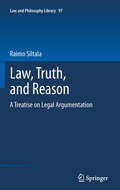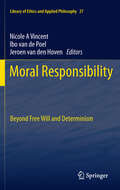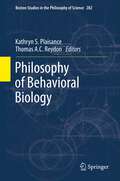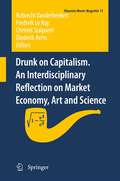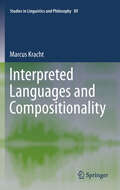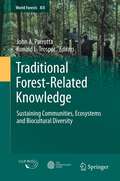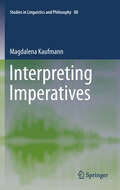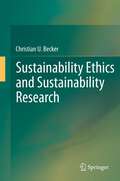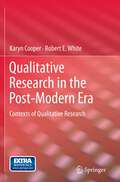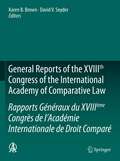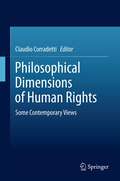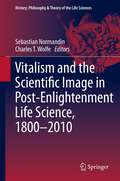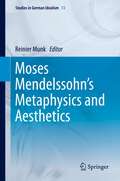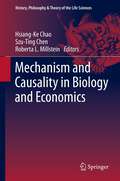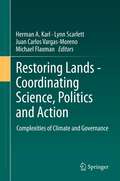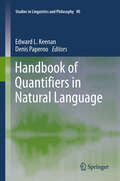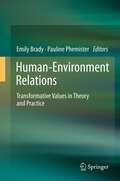- Table View
- List View
Heidegger, Translation, and the Task of Thinking
by F. SchalowNumerous volumes have been written on the philosophy of Martin Heidegger, and new translations of his writings appear on a regular basis. Up to now, however, no book has addressed the connections between Heidegger's thought and the hermeneutic methodology involved in translating his works - or any other text. Gathering essays by internationally recognized scholars, this volume examines the specific synergy that holds between Heidegger's thinking and the distinctive endeavor of translation. Heidegger, Translation, and the Task of Thinking: Essays in Honor of Parvis Emad offers scholars and students alike a rare journey into the insights and intricacies of one of the greatest philosophers of the twentieth century. The book also pays homage to Parvis Emad, Professor Emeritus of Philosophy at De Paul University, founder of the journal Heidegger Studies and a renowned translator of Heidegger's writings. Heidegger, Translation, and the Task of Thinking: Essays in Honor of Parvis Emad provides a uniquely focused perspective on Heidegger's thought, and delves into the strategies and controversies that attend all attempts to translate his most complex and challenging texts, including his seminal works Contributions to Philosophy and Mindfulness. Accordingly, this book will be of great interest and benefit to anyone working in the fields of phenomenology, hermeneutics, or Heidegger studies.
Essays on the Doctrinal Study of Law
by Aulis AarnioEssays on the Doctrinal Study of Law is a summary of the author's 40 years of research in the fields of civil law and the philosophy of law. The main focus is on the two main tasks in the doctrinal study of law: the interpretation and systematisation of legal norms. In this regard, Professor Aarnio deals with the theory of argumentation as well as with its foundations - i.e., with the ontology, epistemology and methodology of legal thinking - and develops the ideas that were first presented in The Rational as Reasonable (Kluwer 1987) in all of these dimensions. The work includes an updated discussion on the writings of Robert Alexy, Jûrgen Habermas, Ronald Dworkin and Alf Ross. A focal point of view concerns the distinction between positivism and non-positivism, in which the core of the criticism focuses on Scandinavian realism.
Sustainability Communication
by Gerd Michelsen Jasmin GodemannModern and professional communication is required to realise the goal of sustainability in society. This book develops a theoretical and empirical framework, integrating interdisciplinary perspectives from communications theory, psychology, sociology, educational sciences, systems theory and constructivism. Its aim is to inform the establishment of sustainability communication. Complementing this theoretical framework, the book provides methods and concepts in a range of fields such as corporate practice, education and media. The book addresses the scientific community and students as well as communicators in all categories of sustainability communication.
Integrating History and Philosophy of Science
by Seymour Mauskopf Tad SchmaltzThough the publication of Kuhn's Structure of Scientific Revolutions seemed to herald the advent of a unified study of the history and philosophy of science, it is a hard fact that history of science and philosophy of science have increasingly grown apart. Recently, however, there has been a series of workshops on both sides of the Atlantic (called '&HPS') intended to bring historians and philosophers of science together to discuss new integrative approaches. This is therefore an especially appropriate time to explore the problems with and prospects for integrating history and philosophy of science. The original essays in this volume, all from specialists in the history of science or philosophy of science, offer such an exploration from a wide variety of perspectives. The volume combines general reflections on the current state of history and philosophy of science with studies of the relation between the two disciplines in specific historical and scientific cases.
Giving Reasons
by Lilian Bermejo LuqueThis book provides a new, linguistic approach to Argumentation Theory. Its main goal is to integrate the logical, dialectical and rhetorical dimensions of argumentation in a model providing a unitary treatment of its justificatory and persuasive powers. This model takes as its basis Speech Acts Theory in order to characterize argumentation as a second-order speech act complex. The result is a systematic and comprehensive theory of the interpretation, analysis and evaluation of arguments. This theory sheds light on the many faces of argumentative communication: verbal and non-verbal, monological and dialogical, literal and non-literal, ordinary and specialized. The book takes into consideration the major current comprehensive accounts of good argumentation (Perelman's New Rhetoric, Pragma-dialectics, the ARG model, the Epistemic Approach) and shows that these accounts have fundamental weaknesses rooted in their instrumentalist conception of argumentation as an activity oriented to a goal external to itself. Furthermore, the author addresses some challenging meta-theoretical questions such as the justification problem for Argumentation Theory models and the relationship between reasoning and arguing.
Human Security: Securing East Asia's Future
by Benny Teh Cheng GuanHuman security is becoming increasingly pronounced in recent years due to changes in the security landscape of world politics. Yet, inter-state relations have continued to dominate security concerns in East Asia. This has, unfortunately, eluded the broader understanding of issues and challenges facing the peoples of East Asia. Home to nations with rapid economic growth and development, East Asia is at the core of what some individuals have termed as the coming Asian Century. Years of economic liberalization and exposure to globalization have permitted the region to achieve high levels of interconnectedness from within and without in unprecedented ways. This has certainly reduced state control and opened up spaces for cross-border human activities. While economic wealth have increased substantially over the years, it has also brought about bigger income disparities, unsustainable safety nets and a surge in social problems from health issues to migratory concerns that threaten the safety and well-being of individuals. Human Security: Securing East Asia's Future timely examines the fundamental issues causing human insecurities and evaluates the extent of which human security plays a role at the state and regional levels. Covering the different areas of threats to humans and applying case study materials, this volume provides an intellectual mix of perspectives that captures the relationship between people, state and region. This book will be of interest to those studying traditional and non-traditional security/threats, Asian human development and critical policy analysis.
Efficiency, Sustainability, and Justice to Future Generations
by Klaus MathisFifty years after the famous essay "The Problem of Social Cost" (1960) by the Nobel laureate Ronald Coase, Law and Economics seems to have become the lingua franca of American jurisprudence, and although its influence on European jurisprudence is only moderate by comparison, it has also gained popularity in Europe. A highly influential publication of a different nature was the Brundtland Report (1987), which extended the concept of sustainability from forestry to the whole of the economy and society. According to this report, development is sustainable when it "meets the needs of the present without compromising the ability of future generations to meet their own needs". A key requirement of sustainable development is justice to future generations. It is still a matter of fact that the law as well as the theories of justice are generally restricted to the resolution of conflicts between contemporaries and between people living in the same country. This in turn raises a number of questions: what is the philosophical justification for intergenerational justice? What bearing does sustainability have on the efficiency principle? How do we put a policy of sustainability into practice, and what is the role of the law in doing so? The present volume is devoted to these questions. In Part One, "Law and Economics", the role of economic analysis and efficiency in law is examined more closely. Part Two, "Law and Sustainability", engages with the themes of sustainable development and justice to future generations. Finally, Part Three, "Law, Economics and Sustainability", addresses the interrelationships between the different aspects.
Law, Truth, and Reason
by Raimo SiltalaThis book is an innovative contribution to analytical jurisprudence. It is mainly based on the distinct premises of linguistic philosophy and Carnapian semantics, but also addresses the issues of institutional philosophy, social pragmatism, and legal principles as envisioned by Dworkin, among others. Wróblewski´s three ideologies (bound/free/legal and rational) and Makkonen´s three situations (isomorphic/semantically vague/normative gap) of judicial decision-making are further developed by means of 10 frames of legal analysis as discerned by the author. With the philosophical theories of truth serving as a reference, the frames of legal analysis include the isomorphic theory of law (Wittgenstein, Makkonen), the coherence theory of law (Alexy, Peczenik, Dworkin), the new rhetoric and legal argumentation theory (Perelman, Aarnio), social consequentialism (Posner), natural law theory (Fuller, Finnis), and the sequential model of legal reasoning by Neil MacCormick and the Bielefelder Kreis. At the end, some key issues of legal metaphysics are addressed, like the notion of legal systematics and the future potential of the analytical approach in jurisprudence.
Moral Responsibility
by Ibo van de Poel Jeroen Van Hoven Nicole A. VincentIt is well over a decade since John Fischer and Mark Ravizza - and before them, Jay Wallace and Daniel Dennett - defended responsibility from the threat of determinism. But defending responsibility from determinism is a potentially endless and largely negative enterprise; it can go on for as long as dissenting voices remain, and although such work strengthens the theoretical foundations of these theories, it won't necessarily build anything on top of those foundations, nor will it move these theories into new territory or explain how to apply them to practical contexts. To this end, the papers in this volume address these more positive challenges by exploring how compatibilist responsibility theory can be extended and/or applied in a range of practical contexts. For instance, how is the narrow philosophical concept of responsibility that was defended from the threat of determinism related to the plural notions of responsibility present in everyday discourse, and how might this more fine-grained understanding of responsibility open up new vistas and challenges for compatibilist theory? What light might compatibilism shed, and what light might be shed upon it, by political debates about access to public welfare in the context of responsibility for one's own health, and by legal debates about the impact of self-intoxication on responsibility. Does compatibilist theory, which was originally designed to cater for analysis of individual actions, scale to scenarios that involve group action and collective responsibility -- e.g. for harms due to human-induced climate change? This book's chapters deal with a range of theoretical problems discussed in classic compatibilist literature -- e.g. the relationship between responsibility and capacity, the role of historical tracing in discounting the exculpatory value of incapacities, and the justifiability of retributive punishment. But instead of motivating their discussions by focusing on the alleged threat that determinism poses to responsibility, these chapters' authors have animated their discussions by tackling important practical problems which crop up in contemporary debates about responsibility.
Philosophy of Behavioral Biology
by Kathryn S. Plaisance Thomas A.C. ReydonThis volume provides a broad overview of issues in the philosophy of behavioral biology, covering four main themes: genetic, developmental, evolutionary, and neurobiological explanations of behavior. It is both interdisciplinary and empirically informed in its approach, addressing philosophical issues that arise from recent scientific findings in biological research on human and non-human animal behavior. Accordingly, it includes papers by professional philosophers and philosophers of science, as well as practicing scientists. Much of the work in this volume builds on presentations given at the international conference, "Biological Explanations of Behavior: Philosophical Perspectives", held in 2008 at the Leibniz Universität Hannover in Germany. The volume is intended to be of interest to a broad range of audiences, which includes philosophers (e.g., philosophers of mind, philosophers of biology, and metaethicists), as well as practicing scientists, such as biologists or psychologists whose interests relate to biological explanations of behavior.
Drunk on Capitalism. An Interdisciplinary Reflection on Market Economy, Art and Science
by Christel Stalpaert Frederik Le Roy Robrecht Vanderbeeken Diederik AertsThe book presents an interdisciplinary collection of analyses that discuss the impact of market economy on our culture in the post-Berlin Wall era. It contains two parts. The first focuses on the commercialisation of science and education. The second elaborates on the multiple and diverse relation between art and capital.
Interpreted Languages and Compositionality
by Marcus KrachtThis book argues that languages are composed of sets of 'signs', rather than 'strings'. This notion, first posited by de Saussure in the early 20th century, has for decades been neglected by linguists, particularly following Chomsky's heavy critiques of the 1950s. Yet since the emergence of formal semantics in the 1970s, the issue of compositionality has gained traction in the theoretical debate, becoming a selling point for linguistic theories. Yet the concept of 'compositionality' itself remains ill-defined, an issue this book addresses. Positioning compositionality as a cornerstone in linguistic theory, it argues that, contrary to widely held beliefs, there exist non-compositional languages, which shows that the concept of compositionality has empirical content. The author asserts that the existence of syntactic structure can flow from the fact that a compositional grammar cannot be delivered without prior agreement on the syntactic structure of the constituents.
Traditional Forest-Related Knowledge
by John A. Parrotta Ronald L. TrosperExploring a topic of vital and ongoing importance, Traditional Forest Knowledge examines the history, current status and trends in the development and application of traditional forest knowledge by local and indigenous communities worldwide. It considers the interplay between traditional beliefs and practices and formal forest science and interrogates the often uneasy relationship between these different knowledge systems. The contents also highlight efforts to conserve and promote traditional forest management practices that balance the environmental, economic and social objectives of forest management. It places these efforts in the context of recent trends towards the devolution of forest management authority in many parts of the world. The book includes regional chapters covering North America, South America, Africa, Europe, Asia and the Australia-Pacific region. As well as relating the general factors mentioned above to these specific areas, these chapters cover issues of special regional significance, such as the importance of traditional knowledge and practices for food security, economic development and cultural identity. Other chapters examine topics ranging from key policy issues to the significant programs of regional and international organisations, and from research ethics and best practices for scientific study of traditional knowledge to the adaptation of traditional forest knowledge to climate change and globalisation.
Interpreting Imperatives
by Magdalena KaufmannImperative clauses are recognized as one of the major clause types alongside those known as declarative and interrogative. Nevertheless, they are still an enigma in the study of meaning, which relies largely on either the concept of truth conditions or the concept of information growth--neither of which are easily applied to imperatives. This book puts forward a fresh perspective. It analyzes imperatives in terms of modalized propositions, and identifies an additional, presuppositional, meaning component that makes an assertive interpretation inappropriate. The author shows how these two elements can help explain the varied effects imperatives have, depending on their usage context. Imperatives have been viewed as elusive components of language because they have a range of functions that makes them difficult to unify theoretically. This fresh view of the semantics-pragmatics interface allows for a uniform semantic analysis while accounting for the pragmatic versatility of imperatives.
Sustainability Ethics and Sustainability Research
by Christian BeckerThe book identifies the specific ethical aspects of sustainability and develops ethical tools to analyze them. It also provides a methodological framework to integrate ethical and scientific analyses of sustainability issues, and explores the notion of a new type of self-reflective inter- and transdisciplinary sustainability research. With this, the book aims to strengthen the overall ability of academics to contribute to the analysis and solution of sustainability issues in an inclusive and integrated way.
Qualitative Research in the Post-Modern Era
by Robert E. White Karyn CooperQualitative Research is changing as a result of postmodern influences which have changed the way research is interpreted and understood. This has prompted questions which have been knocking at the door of qualitative research for some time now: Who is the researcher in this research account? How does the researcher relate to his/her research? How can the researcher who reads qualitative research relate to and understand the nuances and complexities in qualitative research? How can this volume help us to, not only describe, effect and manage change, but help us to understand, imagine and affect policies, practices and procedures related to research? What can we learn from researchers at the top of their stride who have struggled in order to develop qualitative research? The book includes illustrative interviews with world famous scholars. William Pinar, Norman Denzin, Henry Giroux, Zygmunt Bauman and Maxine Greene invite the student to engage reflectively and to figure out the rudiments and connections of research methodology and methods for theses. The developed so called "The Five Contexts" serves as a theoretical framework for conducting, understanding and interpreting qualitative research in a variety of disciplines in this post-modern era .
General Reports of the XVIIIth Congress of the International Academy of Comparative Law/Rapports Généraux du XVIIIème Congrès de l’Académie Internationale de Droit Comparé
by David V. Snyder Karen B. BrownThis title presents twenty-nine topics, prepared by leading scholars in more than 20 countries, providing a comparative analysis of cutting-edge legal topics of the 21st century. Considering topics of vital moment to contemporary legal scholars, the title includes pieces on Surrogate Motherhood, The Balance of Copyright in Comparative Perspective, International Law in Domestic Systems, Constitutional Courts as "Positive Legislators," Same-sex Marriage, Climate Change and the Law, The Regulation of Private Equity, Hedge Funds, and State Funds, and Regulation of Corporate Tax Evasion. Each chapter surveys legal developments in the U.S. and Canada, Europe, Asia, Latin and South America, Africa, and the Middle East in a format that permits the reader easy access to similarities and differences in the approaches of the selected national regimes. This comprehensive volume tells the story of parallel trends in the evolution of legal doctrine despite jurisdictional, cultural, and political barriers. While each of the covered countries stands alone as a sovereign, in a technologically advanced world their disparate systems nonetheless have converged to adopt comparable strategies in dealing with complex legal issues. The volume is a critical addition to the library of any scholar hoping to keep abreast of the major trends in contemporary law.
Philosophical Dimensions of Human Rights
by Claudio CorradettiThis book presents a unique collection of the most relevant perspectives in contemporary human rights philosophy. Different intellectual traditions are brought together to explore some of the core postmodern issues challenging standard justifications. Widely accessible also to non experts, contributions aim at opening new perspectives on the state of the art of the philosophy of human rights. This makes this book particularly suitable to human rights experts as well as master and doctoral students. Further, while conceived in a uniform and homogeneous way, the book is internally organized around three central themes: an introduction to theories of rights and their relation to values; a set of contributions presenting some of the most influential contemporary strategies; and finally a number of articles evaluating those empirical challenges springing from the implementation of human rights. This specific set-up of the book provides readers with a stimulating presentation of a growing and interconnecting number of problems that post-natural law theories face today. While most of the contributions are new and specifically conceived for the present occasion, the volume includes also some recently published influential essays on rights, democracy and their political implementation.
Vitalism and the Scientific Image in Post-Enlightenment Life Science, 1800-2010
by Sebastian Normandin Charles T. WolfeVitalism is understood as impacting the history of the life sciences, medicine and philosophy, representing an epistemological challenge to the dominance of mechanism over the last 200 years, and partly revived with organicism in early theoretical biology. The contributions in this volume portray the history of vitalism from the end of the Enlightenment to the modern day, suggesting some reassessment of what it means both historically and conceptually. As such it includes a wide range of material, employing both historical and philosophical methodologies, and it is divided fairly evenly between 19th and 20th century historical treatments and more contemporary analysis. This volume presents a significant contribution to the current literature in the history and philosophy of science and the history of medicine.
Moses Mendelssohn's Metaphysics and Aesthetics
by Reinier MunkThis book presents an extended dialogue in essay form between specialists in the work of Moses Mendelssohn, and experts in important trends in related late-seventeenth and eighteenth century thought. The first group of contributors explores themes in Mendelssohn's metaphysics and aesthetics, presenting both their internal argumentative coherence and their historical context. The second outlines the context of Mendelssohn's views on specific topics, and describes his contribution to the discussion of them. The essays are organized in four sections. The first pairs two essays on Mendelssohn's theory of language and writing. The second section offers three essays addressing a number of topics in Mathematics and philosophy in Mendelssohn. A group of eight essays follows, dealing with Metaphysics in a historical context. The fourth section presents five essays discussing Mendelssohn's Aesthetics in a historical context. Moses Mendelssohn's Metaphysics and Aesthetics arises from a conference held in Amsterdam in 2009, which gathered numerous authorities to address the central theme. Taken together, these eighteen essays present a sophisticated portrait of Mendelssohn, packed with detail and rich in complexity.
Mechanism and Causality in Biology and Economics
by Szu-Ting Chen Hsiang-Ke Chao Roberta L. MillsteinThis volume addresses fundamental issues in the philosophy of science in the context of two most intriguing fields: biology and economics. Written by authorities and experts in the philosophy of biology and economics, Mechanism and Causality in Biology and Economics provides a structured study of the concepts of mechanism and causality in these disciplines and draws careful juxtapositions between philosophical apparatus and scientific practice. By exploring the issues that are most salient to the contemporary philosophies of biology and economics and by presenting comparative analyses, the book serves as a platform not only for gaining mutual understanding between scientists and philosophers of the life sciences and those of the social sciences, but also for sharing interdisciplinary research that combines both philosophical concepts in both fields. The book begins by defining the concepts of mechanism and causality in biology and economics, respectively. The second and third parts investigate philosophical perspectives of various causal and mechanistic issues in scientific practice in the two fields. These two sections include chapters on causal issues in the theory of evolution; experiments and scientific discovery; representation of causal relations and mechanism by models in economics. The concluding section presents interdisciplinary studies of various topics concerning extrapolation of life sciences and social sciences, including chapters on the philosophical investigation of conjoining biological and economic analyses with, respectively, demography, medicine and sociology.
Restoring Lands - Coordinating Science, Politics and Action
by Herman Karl Juan Carlos Vargas-Moreno Lynn Scarlett Michael FlaxmanEnvironmental issues, vast and varied in their details, unfold at the confluence of people and place. They present complexities in their biophysical details, their scope and scale, and the dynamic character of human action and natural systems. Addressing environmental issues often invokes tensions among battling interests and competing priorities. Air and water pollution, the effects of climate change, ecosystem transformations--these and other environmental issues involve scientific, social, economic, and institutional challenges. This book analyzes why tackling many of these problems is so difficult and why sustainability involves more than adoption of greener, cleaner technologies. Sustainability, as discussed in this book, involves knowledge flows and collaborative decision processes that integrate scientific and technological methods and tools, political and governance structures and regimes, and social and community values. The authors synthesize a holistic and adaptive approach to rethinking the framework for restoring healthy ecosystems that are the foundation for thriving communities and dynamic economies. This approach is that of collective action. Through their research and practical experiences, the authors have learned that much wisdom resides among diverse people in diverse communities. New collaborative decision-making institutions must reflect that diversity and tap into its wisdom while also strengthening linkages among scientists and decision makers. From the pre-publication reviews: "Finally, we have a book that explains how science is irrelevant without people. It's people who decide when and how to use science, not scientists. This book gives us a roadmap for how to really solve complex problems. It involves hard work, and creating new relationships between scientists and the public that don't typically exist in our society." -John M. Hagan, Ph.D. President, Manomet Center for Conservation Sciences
Handbook of Quantifiers in Natural Language
by Denis Paperno Edward KeenanCovering a strikingly diverse range of languages from 12 linguistic families, this handbook is based on responses to a questionnaire constructed by the editors. Focusing on the formation, distribution and semantic interpretation of quantificational expressions, the book explores 17 languages including German, Italian, Russian, Mandarin Chinese, Malagasy, Hebrew, Pima, Basque, and more. The language data sets enable detailed crosslinguistic comparison of numerous features. These include semantic classes of quantifiers (generalized existential, generalized universal, proportional, partitive), syntactically complex quantifiers (intensive modification, Boolean compounding, exception phrases) and several others such as quantifier scope ambiguities, quantifier float, and binary quantifiers. Its theory-independent content extends earlier work by Matthewson (2008) and Bach et al. (1995), making this handbook suitable for linguists, semanticians, philosophers of language and logicians alike.
Characterizing the Robustness of Science: After the Practice Turn in Philosophy of Science (Boston Studies in the Philosophy and History of Science #292)
by William Wimsatt Emiliano Trizio Léna Soler Thomas NicklesMature sciences have been long been characterized in terms of the "successfulness", "reliability" or "trustworthiness" of their theoretical, experimental or technical accomplishments. Today many philosophers of science talk of "robustness", often without specifying in a precise way the meaning of this term. This lack of clarity is the cause of frequent misunderstandings, since all these notions, and that of robustness in particular, are connected to fundamental issues, which concern nothing less than the very nature of science and its specificity with respect to other human practices, the nature of rationality and of scientific progress; and science's claim to be a truth-conducive activity. This book offers for the first time a comprehensive analysis of the problem of robustness, and in general, that of the reliability of science, based on several detailed case studies and on philosophical essays inspired by the so-called practical turn in philosophy of science.
Human-Environment Relations
by Pauline Phemister Emily BradyThis fresh and innovative approach to human-environmental relations will revolutionise our understanding of the boundaries between ourselves and the environment we inhabit. The anthology is predicated on the notion that values shift back and forth between humans and the world around them in an ethical communicative zone called 'value-space'. The contributors examine the transformative interplay between external environments and human values, and identify concrete ways in which these norms, residing in and derived from self and society, are projected onto the environment.

